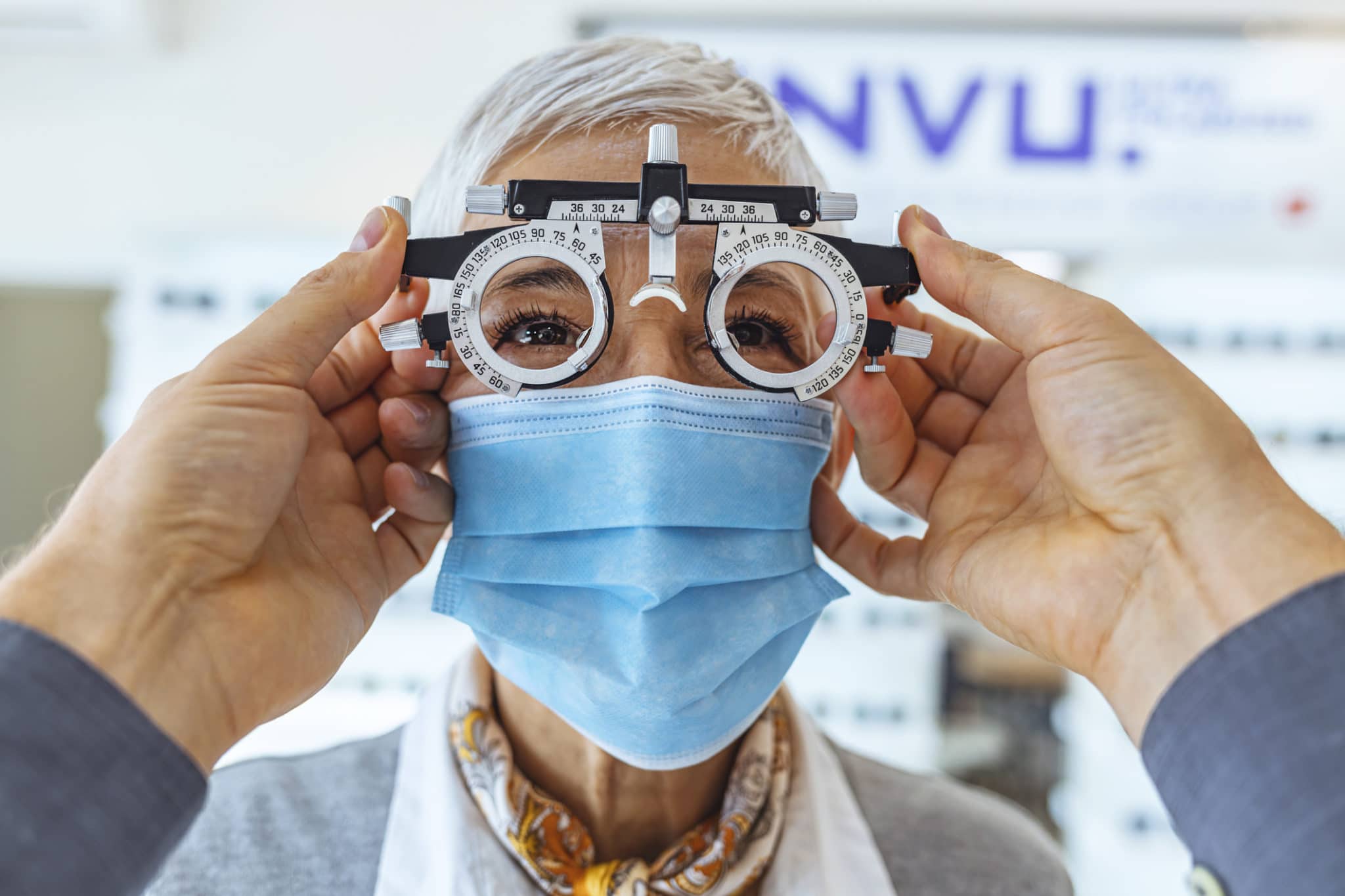Routine Eye Care
Routine Eye Care

If you experience any changes in your vision between regularly scheduled visits with your eye specialist, you should schedule an appointment as soon as possible. Early detection of problems and treatment of problems can be the key to preventing loss of vision.
At what age should i begin taking my child for routine eye exams?
Children should have their first eye exam during infancy. Pediatricians often perform limited eye exams during a child’s first few years of life. However, these typically only observe the surface of the eyes, their alignment, and the light reflex from the pupil. An ophthalmic exam early in life, expressly just before a child starts school, can address any abnormalities that could prevent optimal safety and academic performance.
Why should I get a routine eye exam even if my eyes feel fine?
Vision is only one aspect of eye health. Your routine eye exams can reveal a lot, not only about your eyes but about your general health, too. A thorough eye exam can assess vision and also spot signs of eye diseases that can take years to result in symptoms. The earlier that conditions like cataracts, retinopathy, and glaucoma are detected, the better our chances are of slowing the breakdown of clear vision.
Preparing for Your Eye Exam
When a person calls to make an eye appointment, he or she should be prepared to describe any current vision problems. In addition, patients should ask if the eye examination will affect their vision temporarily and if they will need someone to drive them home. They may also want to ask about the cost of the exam, if their insurance plan will cover any of the cost, and how payment is handled. Before going to the appointment, patients should gather information to help answer questions the eye care professional may ask.
- Symptoms of current eye problems (flashes of light, difficulty seeing at night, temporary double vision, loss of vision, etc.).
- Eye injuries or eye surgeries (approximate dates, where treated).
- Family history of eye problems (glaucoma, macular degeneration, cataracts, etc.).
- Any questions about vision, glasses, contacts, laser surgery, etc.
- A list of all prescriptions and over-the-counter drugs currently being used.
- General health condition (allergies, chronic health problems, operations, etc.).
Patients should also take the following items with them to their eye appointment:
- Glasses, contact lenses or both.
- A list of all prescriptions and over-the-counter drugs currently being taken.
- Medical or health insurance card.
How long doesa routine Eye Exam take?
A routine eye exam may involve several tests along with a brief consultation in which we discuss various details about your vision. For the most part, patients can expect to be in the office about an hour for their routine exam.
 Signs that an Eye Exam May be Needed:
Signs that an Eye Exam May be Needed:
- Arms are suddenly “too short,” i.e., need to hold the newspaper or other reading material far away.
- Unusual difficulty adjusting to dark rooms.
- Difficulty focusing on close or distant objects.
- Unusual sensitivity to light or glare.
- Change in the color of the iris.
- Red-rimmed, encrusted, or swollen lids.
- Recurrent pain in or around the eyes.
- Double vision.
- Dark spot at the center of their vision.
- Lines and straight edges appear wavy or distorted.
- Excess tearing or “watery eyes.”
- Dry eyes with itching or burning.
- Seeing spots or ghost-like images.
If you are experiencing any of the symptoms above schedule an eye exam at Jacksonville Eye Center.
Symptoms of Eye Problems
The following symptoms are indications of serious medical problems that require immediate attention:
- Sudden loss of vision in one eye.
- Sudden hazy or blurred vision.
- Flashes of light or black spots in the field of vision.
- Halos or rainbows around lights.
- Curtain-like blotting out of vision.
- Loss of peripheral (side) vision.
If you are experiencing any of these symptoms call out office immediately at Jacksonville Eye Center. If it is after office hours please go to your local emergency room.
What’s the difference between a comprehensive exe exam and a routine eye exam?
Eye health is a critical aspect of lifelong well-being. Adults are encouraged to see their eye doctor regularly, but that may be too vague of a guideline. Our practice is equipped to offer both routine eye exams and comprehensive eye exams, and there are good reasons to have both.
The purpose of a routine eye exam is to evaluate the eyes for common refractive errors. According to studies, approximately 80% of vision problems in the United States are caused by some type of refractive error. Examples include nearsightedness and farsightedness, presbyopia, and astigmatism. Refractive errors involve the abnormal “bending” of light as it passes through the eye. Light does not hit the light-sensitive cells on the retina, so images appear blurred. Refractive errors can also cause other symptoms, such as eye strain, headaches, and glares or halos around light sources.
The screenings performed during a routine eye exam assess how well a person sees at various distances. If needed, screenings can then determine the type and degree of refractive error and the corrective prescription that can support clear vision.
A comprehensive eye exam should also be performed every few years. The purpose of the ophthalmic exam vs the optometry exam is to evaluate the overall health of the eyes. The various tests involved in the comprehensive eye exam measure data like intraocular pressure and the condition of important structures at the back of the eye, including blood vessels and the optic nerve. The vast majority of eye diseases that may occur are “silent.” They do not cause pain or obvious symptoms until they have progressed. Comprehensive eye exams help patients remain abreast of their current eye health and, if signs of eye disease are found, receive prompt, appropriate treatment to slow the progression of the condition.
Your Routine Eye Exam:
Visual acuity tests measure the smallest object each eye can see at a certain distance. Normally, each eye will be done individually by covering one eye at a time. The use of the Snellen chart is the most common way to test visual acuity. This chart letters and numbers that decrease in size. When taking the test, the distance between the patient and the chart is 20 feet.
20/20 vision is normal. If a person has 20/40 vision, they see at twenty feet what a normal eye sees at forty feet. If a person has 20/200 vision, they are legally blind. They only see at twenty feet what a normal eye sees at two hundred feet. If they have 20/15 vision, they see better than normal. They see at twenty feet what the normal eye would have to bring in to fifteen feet to see.
Comprehensive Eye Exams
Comprehensive eye exams for adults include the following:
- Review of family and personal health history.
- Examination of the interior and exterior of the eye for signs of eye disease or general health problems such as diabetes or hardening of the arteries.
- Eye pressure and field of vision tests to diagnose glaucoma.
- Tests of ability to see sharply and clearly at both close and far distances.
- Tests to determine the presence of nearsightedness, farsightedness, astigmatism, depth perception problems, and in people over age 40, presbyopia
- Check of eye coordination and eye muscle function to make sure the eyes are working together as a team.
- Test of ability to change focus easily from near to far, and vice versa.
Are routine eye exams covered by insurance?
Insurance coverage can be somewhat challenging to understand. Medical insurance generally only covers services related to a medical eye problem, not routine eye care. However, vision plans often provide coverage for routine services and consequential costs like eyeglasses or contact lenses. Before your routine eye exam or comprehensive eye exam, it is important to contact your medical or vision insurance for up-to-date information regarding your coverage.
Schedule a Consultation
Your visit to Jacksonville Eye Center will include a discussion of the exam’s findings and any treatment prescribed. Click here to schedule your appointment today! Or you can call our office at 904-355-5555.


 Signs that an Eye Exam May be Needed:
Signs that an Eye Exam May be Needed: